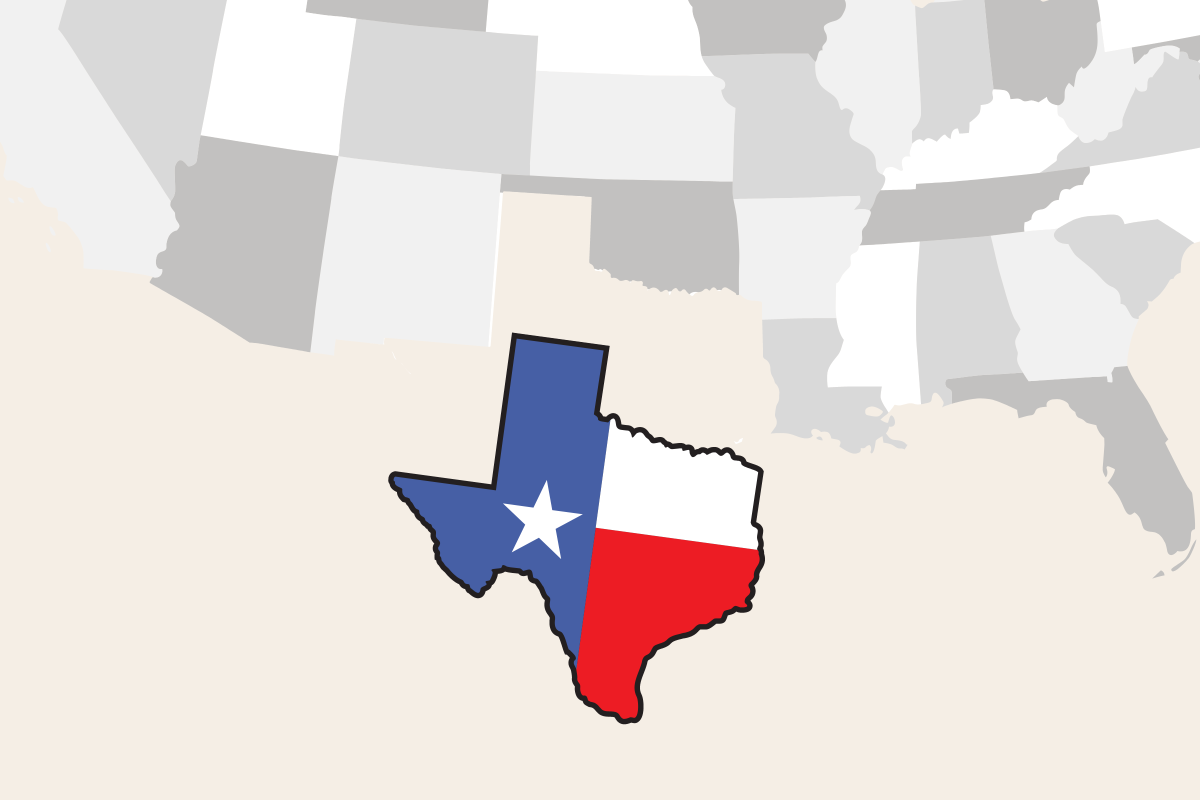Texans would vote to remain part of the United States if an independence referendum were held in the Lone Star State, according to a new poll carried out exclusively for Newsweek.
The survey, conducted by Redfield & Wilton Strategies, asked 814 eligible voters in Texas whether they would support the state leaving the American Union to become an independent country and how they would vote in a hypothetical secessionist referendum on this question. Overall, 39 percent were against secession, 33 percent supported it, while the rest neither supported nor opposed it or were unsure. However, in a hypothetical referendum, 67 percent would vote for Texas to remain a state within the United States.
Pro-independence figures told Newsweek that the results demonstrated there was sufficient support for a vote on the issue. Political scientists were more divided, with one saying the results mirrored those of other results for successful secessionist movements in their relatively early stages, such as Brexit campaign in the United Kingdom. Others said that when presented with the potential costs of such a move, even supporters of secession would likely think twice.
There has been growing interest in what would happen if Texas did vote to become an independent nation, as it was for nine years between declaring independence from Mexico in 1836 and joining the United States in 1845. Such calls have been intensified by tensions between authorities in Texas and the federal government over how to handle migration across the Mexico border.
In the latest poll for Newsweek, asked "To what extent, if at all, would you support or oppose Texas succeeding from the United States and becoming an independent republic," 17 percent of respondents said "strongly support," 16 percent "support," 21 percent "neither support nor oppose," 12 percent "oppose" and 27 percent "strongly oppose" with another 7 percent unsure. The survey was conducted between 1 and 3 February online.
The respondents were also asked how they would vote in a referendum on the question of "Should Texas be a state within the United States or should Texas be an independent country?" with 67 percent replying "a state within the United States," 23 percent opting for "an independent country" and the remaining 10 percent answering "don't know."
There was a notable political divided in how Texans answered the question. Thirty-six percent of those who voted for Donald Trump in 2020 said they'd vote for independence, along with just 6 percent of those who voted for Joe Biden. Of those who didn't vote in 2020, 27 percent said they'd back independence, along with 35 percent of those who voted for third-party candidates.
However, in better news for Texas independence campaigners, when asked for their response to the statement, "If it left the United States, Texas could succeed as an independent country," 22 percent chose "strongly agree" and another 22 percent chose "agree," versus 17 percent for "strongly disagree" and 13 percent for "disagree." Another 20 percent said that they "neither agree nor disagree."
Daniel Miller, president of the pro-independence Texan Nationalist Movement, told Newsweek the survey demonstrates the need for a referendum on Texan secession from the Union.
"Contrary to the opposition narrative that support for Texit is non-existent, this poll shows that support for the issue is strong enough to warrant a public discussion and a vote on the issue," he said.
"Even if one believes the accuracy of this poll, it shows that Texit is polling at the same support level as Brexit and Scottish Independence before their referendums were held. It also shows that the opposition to Texit is far weaker than they pretend.
"In the end, the only poll that matters is the one that all Texans get to participate in when Texit goes on the ballot."
Miller also sent Newsweek a SurveyUSA poll of 625 Texan adults conducted between 21 June 2022 and 30 June 2022, which found 60 percent of respondents would support "Texas peacefully becoming an independent country along with other conservative states," against 40 percent who were opposed.

Professor Matt Qvortrup, a political scientist who specializes in new state formation and author of I Want to Break Free: A Practical Guide to Making a New Country, told Newsweek the results mean the Texan independence movement should be taken seriously.
"These are not bad polls. In fact, they suggest that those who want 'Texit' are at the same level of support as those who supported Brexit in 2010—and of course that changed," he said.
"In independence referendums, you often see that those who want to secede win over the campaign. In Scotland, the SNP (the Scottish National Party) came from 29 percent at the beginning of the campaign and ended on 45 percent.
"In Catalonia, Quebec, and in Scotland, support for independence was in the twenties when the issue was first discussed. This has in all cases moved within touching distance of independence. The polls may seem disheartening to those who believe that Texit is imminent. But these percentages should worry those who—like Governor Abbott—who are against 'Texit.'"
Tensions between Texan authorities and the Biden administration have surged in recent weeks over how to handle illegal migration across the Mexican border. On January 22, the Supreme Court ruled federal agents could remove razor wire that had been placed at the border to deter crossings on the orders of Texas Governor Greg Abbott. This sparked a furious response from the Republican, who invoked the state's "constitutional authority to defend and protect itself" and claimed it was being subject to an "invasion."
Posting on his Truth Social website Trump, by some margin the 2024 Republican presidential frontrunner, urged other GOP-run states to send their National Guards to Texas to support Abbott's border controls.
James Henson, who heads the Texas Politics Project at the University of Texas at Austin, told Newsweek the results are more likely to encourage the defiance of current Texan authorities than trigger a real debate about independence.
"I think the results confirm what we've seen in the public discourse around the fantasy of secession: the idea of Texas secession taps into the symbolism of Texas independence, which speaks to a minority share of the state's residents, especially when there is no consideration of the what the costs and trade-offs would be in such a scenario in either the poll question or the policy discussion, such as it is," he said.
"A question about Texas independence or secession offers a cost-free opportunity to support a position laden with symbolic meaning (i.e. the idea of an independent Texas) and to express opposition to federal authority, a non-trivial minority of Texans' will take that opportunity to answer a question in way that lets them do both.
"In terms of political impact, the propagation of such results are much more likely to encourage continued defiance of federal authority by the current crop of elected leaders in Texas than it is to result in any serious or impactful consideration of actual secession or independence."
Joshua Black, a political scientist who is also part of the Texas Politics Project, said support for independence may well decrease if Texans start giving the question serious consideration.
"These results largely support the notion that the secessionist sentiment is a minority one in Texas," he said.
"Even when presented in the most favorable of lights with no mention of potential violence or any tradeoffs whatsoever, fewer than a quarter of Texans seem to say they support secession from the United States when put to an up or down vote.
"It's not unreasonable to expect support to decrease from this already low level if a real discussion began about the realities of Texas becoming an independent country, including the need for a far larger and more involved Texas government, as well as related impacts to trade, business, and even the movement of its citizens."
Uncommon Knowledge
Newsweek is committed to challenging conventional wisdom and finding connections in the search for common ground.
Newsweek is committed to challenging conventional wisdom and finding connections in the search for common ground.
fairness meter
To Rate This Article
About the writer
James Bickerton is a Newsweek U.S. News reporter based in London, U.K. His focus is covering U.S. politics and world ... Read more
To read how Newsweek uses AI as a newsroom tool, Click here.








